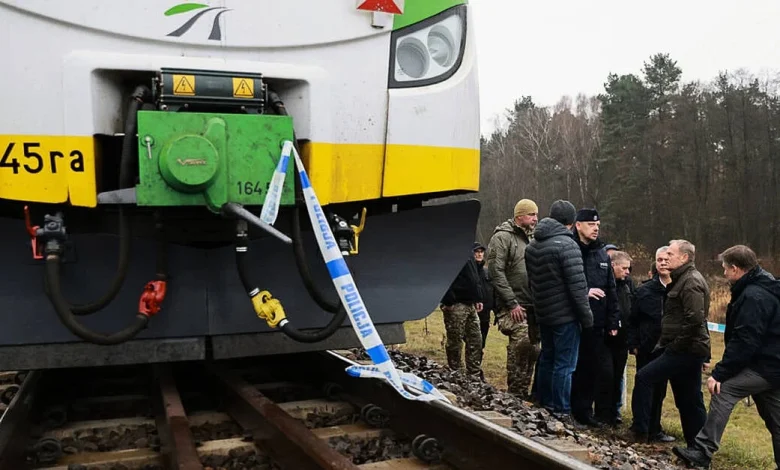Blast on section of rail line used for deliveries to Ukraine ‘act of sabotage’

Poland’s Prime Minister Donald Tusk has said an explosion on a section of railway line used for deliveries to Ukraine was an “unprecedented act of sabotage”.
A Polish security source told The Associated Press (AP) that authorities are investigating whether the blast on Sunday on the line linking Warsaw to south-eastern Poland is connected to Russia, Belarus or their proxies.
Mr Tusk has vowed that Poland will catch the perpetrators, “whoever they are”.
While visiting the site on Monday, the prime minister said the incident had taken place on a line that is vital for delivering aid to Ukraine.
Polish officials said they were sure an explosive device had been detonated on a section of track between Warsaw and Lublin and later discovered damage to overhead cables on the same line.
Both were likely to have been sabotage, Polish officials said.
Nato secretary-general Mark Rutte said the alliance is in close contact with Polish officials and is awaiting the outcome of the investigation.
Western officials have accused Russia and its proxies of staging dozens of attacks and other incidents across Europe since the invasion of Ukraine three years ago, according to data collected by the AP.
Moscow’s goal, Western officials say, is to undermine support for Ukraine, spark fear and divide European societies.
The likelihood that the two incidents on the railway line happened “on the order of foreign services” was “very high”, said Tomasz Siemoniak, Poland’s security services minister.
Investigators probing the two cases of suspected sabotage are investigating whether they were deliberate acts by a hostile state, said the Polish security source.
Prime Minister Donald Tusk, second right, visits the site of the rail line in Mika that was damaged by sabotage, near Deblin, Poland (KPRM/AP)
“The perpetrators demonstrated high professionalism and expert training,” they said.
A train driver on the line between the capital Warsaw and Lublin in south-eastern Poland reported problems with the track at around 7.40am local time on Sunday.
Further inspection determined there was damage to a section of track near the village of Mika, about 100 kilometres (62 miles) south east of Warsaw, officials said.
“We can say beyond any doubt that an explosive device was detonated, damaging the railway tracks,” Polish interior minister Marcin Kierwinski said.
It was not immediately clear whether the explosion and damage occurred late on Saturday or early on Sunday.
Two passengers and several staff members were on the train, but no injuries were reported, officials said.
Defence minister Wladyslaw Kosiniak-Kamysz said on Monday that the army plans to examine 120 kilometres (about 75 miles) of the Warsaw-Lublin-Hrubieszow line, which links the capital to Ukraine by rail and road.
Another train on the Swinoujscie-Rzeszow route that travels along the same line was forced to stop on Sunday night at Pulawy, about 50 kilometres (31 miles) from Lublin, after the overhead electrical cables were damaged, Mr Kierwinski said on Monday.
Around 60 metres (196ft) of power lines were damaged, he said.
The line between war and peace has been blurred
Finland’s President Alexander Stubb
Pulawy is situated between Mika and Lublin on the same train line linking Warsaw to the Ukrainian border.
At the time the train stopped, there were 475 passengers on board but no injuries were reported despite the damaged power lines breaking several of the train’s windows.
Speaking with Mr Rutte at a press conference in Brussels following the announcement from Poland, Finland’s President Alexander Stubb said European nations need to keep “cool heads”.
He warned about overreacting to incidents of alleged Russian disruption, warning that “this is unfortunately the new normal. What Russia is trying to do is to destabilise our societies through information and other campaigns”.
In an interview with Saturday at a Finnish military base, Mr Stubb said Moscow is conducting “two types of warfare” – a kinetic war in Ukraine and a hybrid war in Europe.
“The line between war and peace has been blurred,” Mr Stubb said.





